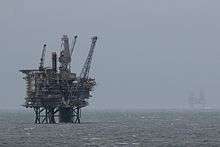Gyda Oil Field
| Gyda | |
|---|---|
 Location of Gyda | |
| Country | Norway |
| Location | North Sea |
| Block | 2/1 |
| Offshore/onshore | Offshore |
| Coordinates | 56°54′41.39″N 3°6′30.39″E / 56.9114972°N 3.1084417°ECoordinates: 56°54′41.39″N 3°6′30.39″E / 56.9114972°N 3.1084417°E |
| Operator | Talisman Energy Norge AS |
| Partners |
Talisman Energy Norge AS (61%) DONG Energy (34%) Norske AEDC AS (5%) |
| Field history | |
| Discovery | 1980 |
| Start of production | 1990 |
| Abandonment | 2018 |
| Production | |
| Current production of oil | 10,000 barrels per day (~5.0×105 t/a) |
| Recoverable gas | 6.6×109 m3 (230×109 cu ft) |
| Producing formations | Upper Jurassic[1] |
Gyda (Norwegian: Gydafeltet) is an offshore oil field located in the southern Norwegian section of North Sea along with Ula, Tambar and Tambar East fields making up the UGT area, usually attributed to DONG Energy's main areas of exploration and production activity.[2] The Gyda field was discovered in 1980 and started producing on June 21, 1990.[1] The field contains confirmed 39.6 million m3 of oil and 6.6 billion cubic meter of natural gas.[1]
Ownership

Talisman Energy is the operator of the field with 61% of interest in the project. The full share was bought by Talisman Energy in 2003 from the previous operator, BP for $82 million.[3] Partners of Talisman Energy, DONG Energy and Norske AEDC AS (NAEDC),owned by Arabian Oil Company (AOC), hold 34% and 5% interest in the project, respectively. holds 34%[4][5] Capital spending on Gyda was expected to be $131 million.[6]
Production
Gyda is located in approximately 66 m (217 ft) of water. The main reservoir stands at 4,000 m (13,000 ft) in the Upper Jurassic Ula Formation.[1] The field has one conventional steel facility with production, drilling, living quarters. Gyda currently produces an average of 10,000 bbl/d (1,600 m3/d).[5] The field also produces excessive amount of water making the oil production stable. Due to the difficulties, the production license was extended to 2018. Several new wells are currently being drilled. The produced oil is transported by a pipeline to Ekofisk oil field and on to Teesside for refining.[1]
See also
References
- 1 2 3 4 5 OLJEDIREKTORATET Norwegian Petroleum Directorate. Gyda
- ↑ "DONG Ups Stake in Norway's Ula Field". Rigzone. 2008-06-02. Retrieved 2010-03-18.
- ↑ "Canada: Oil Field Acquisition". The New York Times. 2003-05-20. Retrieved 2010-04-05.
- ↑ "BP To Sell Gyda Field Interests To Talisman -- Amendment". Globe Newswire. 2003-05-19. Retrieved 2010-04-05.
- 1 2 Arabian oil Company. Norwegian North Sea
- ↑ "Talisman to Drill Gyda Sor Well with Maersk Guardian Jackup". Rigzone. 2008-10-13. Retrieved 2010-04-05.
